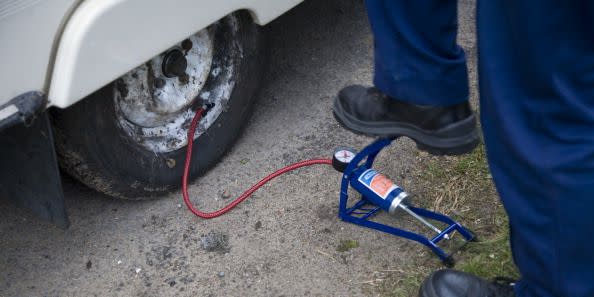Does Insurance Cover a Flat Tire: Everything You Need to Know

Does Auto Insurance Cover a Flat Tire?
Typically, auto insurance companies don't include coverage for flat tires because that's considered wear and tear on your vehicle. However, if you blow a tire, your policy might pay for part of the repairs to your vehicle's rims or body. A roadside assistance program, which might be included with your coverage, can help you if you have a flat tire.
The purpose of car insurance is to give you coverage in case of unexpected events. For instance, if you get into an unexpected accident, the insurance will cover the associated repairs. Wear and tear on your vehicle is considered an expected event and part of vehicle ownership.
Your vehicle's tires need replacement periodically when the tread wears down. You might also accidentally overinflate or underinflate the tire. When these instances occur, your insurer will not cover the cost of replacing the tire.
On the other hand, your insurer might cover any damage caused by the flat tire. For instance, if your tires were slashed or stolen, the insurance might cover the costs to repair or replace those tires.
You must have comprehensive coverage for that to happen, and it might not be worth it to file a claim with your insurer. According to Motor1.com, insurance deductibles usually range between $500 to $1000, so you should compare the value of your tire against your deductible.
What Is Roadside Assistance?
If experiencing a flat tire is a concern of yours, you might want to purchase roadside assistance through your insurer or a third-party issuer, such as AAA. According to 4AutoInsurance.com, roadside assistance programs usually cost between $50 to $200 annually.
Keep in mind that these programs won't cover the costs that are associated with replacing your flat tire. However, they will cover the costs pertaining to sending someone to your location to tow your vehicle, help you if you run out of gas, or change the flat tire.
Does Car Insurance Cover Tire Blowouts?
Extreme temperatures, overinflation, tread wear, and road debris can cause tires to lose air or pop. When this happens, you might wonder if auto insurance will cover a tire blowout.
Insurance coverage for blowouts are similar to that of a flat tire: the tire itself isn't covered through the policy, but any damage you incur might be covered. It also depends upon the type of coverage you have.
For instance, if your tire pops on the highway and the tire flies off your vehicle causing damage, comprehensive coverage will likely pay for the vehicle's body damage. If the popped tire causes you to lose control and swerve off the road where you hit a tree, collision coverage covers the body damage.
In either situation, only the damages are covered. It's your responsibility to replace the tire, however, and that cost doesn't count toward the deductible if you choose to file a claim.
Does Car Insurance Cover Other Types of Tire Damage?
If you live in a location where roads aren't properly maintained or you drive over potholes, you might end up with a flat tire if you hit one of these bumps in the road. You might also wonder if car insurance covers any type of damage associated with potholes.
Usually, if you have collision coverage, any damage done to your vehicle from hitting potholes is covered. Note that this coverage is limited to the frame and other parts of your vehicle, but it typically doesn't include the actual tire replacement.
In rare situations, your wheels might come loose and must be placed back on the vehicle. If this happens to you and the person who replaces the tire does so incorrectly or causes damage to the undercarriage, you can file a claim for the damage.
These claims are considered collisions, which means the body damage and wheels should be included in your policy's coverage as long as you have the correct type of coverage. As long as you can prove negligence, you should be able to get reimbursement for your deductible. Otherwise, you would be considered the at-fault driver for the collision, even if your loose wheels caused the accident.
Regardless of the type of damage, if you want to file a claim, you must do so sooner rather than later. Every state has a specific timeframe as to when you can file claims or lawsuits pertaining to an accident.
How Can You Protect Your Tires?
To protect your vehicle and its tires, you can practice several important habits:
Be a cautious driver. Constantly slamming on the brakes or speeding increases the risk of overheating your tires. If your tires already have cracks, you could also make your tires worse by continually driving this way.
Drive your vehicle regularly. If your vehicle sits for a while, the tires start to rot. Driving the vehicle regularly lowers the chance of this happening by keeping the tires warm.
Use a protectant. A water-based chemical that provides UV protection to rubber, vinyl, and plastic, a protectant can keep your tire from cracking and developing dry rot.
Rotate your tires. It's best to do this every six months or 7500 miles.
Examine the wheel alignment. When your wheels aren't aligned, your vehicle can pull to one side and might experience tire failure.
Check for tire wear. Tread wears down and can lead to less traction.
If you're concerned that your vehicle has loose tires or ones that are losing their tread, it's important to get them checked. Doing so can help prevent your tires from becoming flat or experiencing a blowout. Most insurance companies won't pay for damage done due to a damaged tire, but if you have collision coverage, you might qualify for coverage.
Check this out if you need additional information, resources, or guidance on car insurance.
Sources:
https://www.4autoinsurancequote.com/will-auto-insurance-cover-a-flat-tire/
https://www.caranddriver.com/features/a26012411/how-to-change-tire/
https://www.caranddriver.com/features/a15129724/get-in-line-do-it-yourself-wheel-alignment/
https://www.motor1.com/reviews/409149/does-insurance-cover-tires/
You Might Also Like
